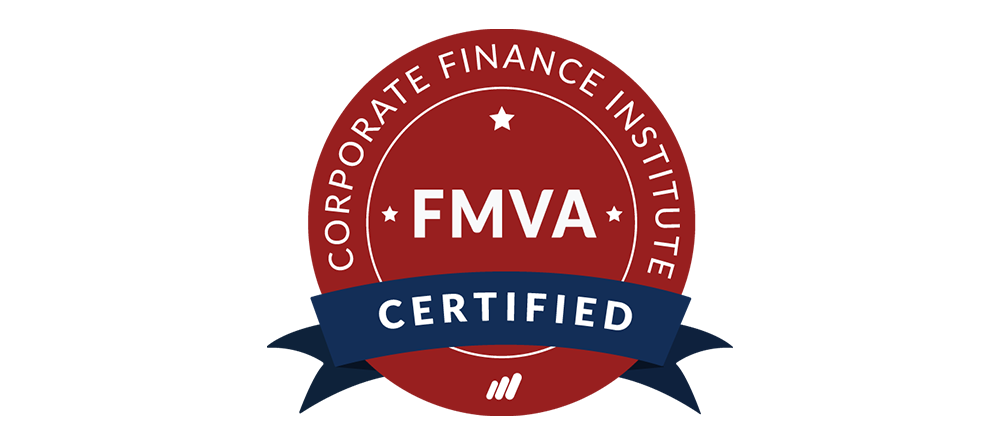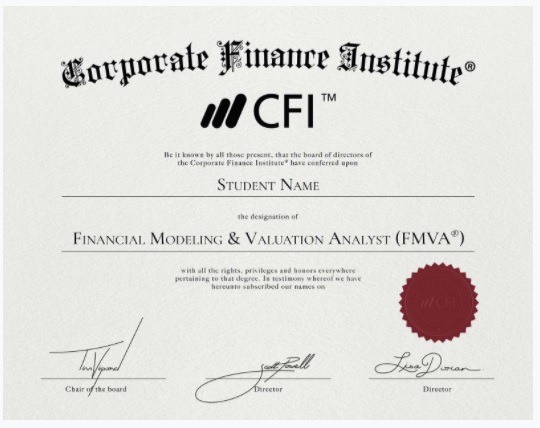Introduction
The FMVA (Financial Modeling and Valuation Analyst) certification, offered by the Corporate Finance Institute (CFI), has become a significant credential in the finance industry. This program equips individuals with advanced skills in financial modeling and valuation. With over 100,000 annual enrollments from approximately 170 countries, it highlights its relevance in today’s competitive job market.

Quick Summary:
Name: FMVA® certification program
Modules: 63 total courses (17 required) [Consisting of 3524 lessons]
Mode: Self-Paced & 100% Online
Duration: 3-6 months
Skills: Financial Statement Analysis, Modeling, Accounting, Budgeting, Forecasting, Excel & PowerPoint
Career Paths: Investment Banking, Private Equity, Equity Research, FP&A & Corp Development
This article provides a comprehensive review of CFI’s FMVA course, covering essential aspects such as:
- Pros and cons of pursuing the certification
- Pricing details and associated costs
- Advantages over other finance courses
- Placement opportunities available for certified professionals
The key takeaway will address whether the FMVA certification is worth pursuing in 2024. Through this exploration, you will gain insights into how this program can enhance your career prospects and align with your professional goals. If you’re considering advancing your skills in financial modeling and valuation, this review will guide you through the potential benefits and challenges associated with the FMVA certification.
Understanding the FMVA Certification

The FMVA (Financial Modeling and Valuation Analyst) certification, offered by the Corporate Finance Institute (CFI), is designed to equip professionals with essential skills in financial modeling and valuation. Its relevance in today’s job market stems from the increasing demand for financial analysts who can interpret complex data and provide actionable insights. As organizations seek data-driven decision-making, the FMVA certification stands out as a practical credential that demonstrates proficiency in key financial concepts.
FMVA Course Structure
The FMVA program consists of a comprehensive curriculum divided into several modules. Each module focuses on critical areas of finance, ensuring participants acquire both theoretical knowledge and practical skills. Key modules include:
- Budgeting: Understanding how to create and analyze budgets, which is essential for effective financial planning.
- Forecasting: Learning techniques to predict future financial outcomes based on historical data, enabling better strategic planning.
- Asset Valuation: Gaining insights into various methods for valuing assets, crucial for investment analysis and corporate finance.
In addition to these core modules, the program offers elective courses such as Advanced Excel and LBO Modeling. This modular structure allows you to tailor your learning experience according to personal interests or career goals.
The course incorporates interactive elements like quizzes, real-world case studies, and downloadable templates. These practical applications ensure that you not only understand theoretical concepts but also learn how to apply them effectively in real-life scenarios. The emphasis on execution aligns with the needs of modern finance roles, making the FMVA certification a valuable asset for anyone pursuing a career in finance.
With no prerequisites required for enrollment, individuals from diverse backgrounds can embark on this educational journey. This accessibility contributes to its popularity among aspiring finance professionals worldwide.
Pros and Cons of Pursuing the FMVA Certification
The FMVA certification offers a mix of benefits and limitations that prospective candidates should carefully consider.
| Advantages | Limitations |
|---|---|
| Practical Skill Development | Limited Networking Opportunities |
| Industry Recognition | Self-Paced Learning Challenges |
| High Value for Money | Perceived Value Compared to Established Certifications |
| Accessible to All Backgrounds |
Advantages of the FMVA Certification
- Practical Skills Development: The program emphasizes hands-on learning, enabling you to acquire skills in financial modeling, valuation techniques, budgeting, and forecasting. Real-world case studies enhance your understanding and application of these concepts.
- Industry Recognition: Many top firms, including Amazon and BlackRock, acknowledge the value of the FMVA certification. This recognition can significantly boost your resume and improve job prospects in competitive finance roles.
- Flexible Learning Environment: The online format allows you to study at your own pace, accommodating various schedules. This flexibility makes it an attractive option for working professionals or those with other commitments.
- Accessible to All Backgrounds: With no prerequisites necessary for enrollment, individuals from non-financial backgrounds can also pursue this certification. This inclusivity broadens opportunities for career transitioners.
Limitations of the FMVA Certification
- Limited Networking Opportunities: Unlike traditional programs that foster in-person interactions, the FMVA course primarily relies on an online platform. This lack of face-to-face networking may hinder relationship-building with peers and industry professionals.
- Self-Paced Learning Challenges: While self-paced learning enables flexibility, it can also pose challenges. Some learners may struggle with time management or find motivation difficult without structured guidance.
- Perceived Value Compared to Established Certifications: Although gaining traction in the finance sector, the FMVA may not hold as much weight as more established certifications like the CFA (Chartered Financial Analyst). Employers may still prioritize these traditional credentials in certain roles.
When evaluating whether to pursue the FMVA certification, weigh these pros and cons against your personal career goals and aspirations. An informed decision will help align your educational choices with your professional path.
Comparative Analysis: FMVA vs Other Finance Certifications
When evaluating the FMVA certification against other finance certifications like CFA (Chartered Financial Analyst) and FRM (Financial Risk Manager), several key differences emerge.
Key Differences
1. Focus and Curriculum
- FMVA: Centered around practical skills in financial modeling and valuation. The curriculum includes topics such as budgeting, forecasting, and asset valuation.
- CFA: Emphasizes investment management, covering a broader range of topics like portfolio management, equity analysis, and ethics. It requires extensive study due to the depth of material.
- FRM: Concentrates on risk management principles and practices, focusing on market risk, credit risk, and operational risk.
2. Duration and Structure
- FMVA: Flexible online format allowing completion in 3 to 6 months at your own pace.
- CFA: Typically requires a commitment of several years to complete all three levels, with exams offered annually.
- FRM: Comprises two parts that can be completed within a year, but can also take longer depending on individual schedules.
Value Proposition for Different Career Paths
Choosing between these certifications hinges on your career aspirations:
1. FMVA
Ideal for those seeking roles in financial analysis, corporate finance, or investment banking. The hands-on approach equips you with practical skills directly applicable to day-to-day responsibilities. For individuals interested in advancing their knowledge further, pursuing a master’s degree such as an MS in Financial Management & Investment Analysis could be beneficial.
2. CFA
Best suited for those aiming for careers in investment management or equity research. The rigorous curriculum is respected globally and may lead to higher-level positions in finance.
3. FRM
Recommended for individuals pursuing careers in risk management. The knowledge gained is critical for navigating financial markets’ complexities.
Selecting between FMVA, CFA, or FRM depends largely on your career goals and the specific skills you wish to develop.
Cost Breakdown and Time Commitment for Completing The FMVA Program
Determining the FMVA cost and time commitment is essential for prospective students. Here’s a detailed breakdown:
Enrollment Costs
- Course Fee: The FMVA certification program typically costs around $497 (get 50% discount click here).
- Annual Membership Fee: To access course materials and resources, an annual membership fee of approximately $199 is required. This fee allows ongoing access to updates and additional resources.
Additional Fees
- Look out for optional elective courses which may incur extra costs, depending on your choices.
- Ensure to factor in any potential costs for supplementary resources or tools that enhance your learning experience.
Time Commitment
The typical duration for completion of the FMVA program ranges from 3 to 6 months.
- Students have reported varying timelines based on their personal schedules and pacing.
- The program’s flexible structure allows you to manage your learning according to your availability, making it accessible for both full-time professionals and students.
Understanding these financial and time commitments is vital when considering whether the FMVA certification aligns with your career objectives.
Career Opportunities After Obtaining The FMVA Certification
The FMVA certification opens doors to a variety of career paths in the finance sector. Here are some potential job roles available to certified professionals:
- Financial Analyst: Analyze financial data, create reports, and assist in investment decisions.
- Investment Banking Associate: Support mergers and acquisitions, financial modeling, and client presentations.
- Corporate Development Analyst: Evaluate potential acquisition targets and strategic partnerships.
- Private Equity Analyst: Assess investment opportunities and conduct due diligence on potential deals.
With the growing recognition of the FMVA certification, salary expectations also reflect its value in the job market. Entry-level positions typically offer salaries ranging from $80,000 to $100,000, while more experienced roles can command compensation between $100,000 and $125,000.
The practical skills gained from the Financial Modeling Course enhance your employability, making you an attractive candidate for top firms. Notable employers such as Amazon and BlackRock actively seek out professionals with this certification.
In addition to technical skills, the FMVA program emphasizes real-world applications. This practical approach prepares candidates for challenges they may face in their roles. By equipping you with essential tools for financial modeling and valuation, the FMVA certification provides a strong foundation for a successful career in finance.
Real-World Applications Of Skills Gained Through The FMVA Course
The FMVA certification equips you with practical skills that are directly applicable in the finance industry. One significant area where this knowledge shines is in Mergers & Acquisitions (M&A).
Key applications of M&A knowledge include:
- Valuation Techniques: Understanding how to assess a company’s worth through various methods, such as Discounted Cash Flow (DCF) analysis or Comparable Company Analysis. This allows you to make informed decisions during negotiations.
- Financial Modeling: Building comprehensive financial models to simulate potential outcomes of M&A transactions. This includes projecting future cash flows and understanding synergies that can result from a merger.
- Due Diligence: Conducting thorough due diligence to evaluate risks associated with a target company. Skills learned in the FMVA course enable you to identify financial red flags and assess the overall health of the business.
- Integration Planning: Developing strategies for post-merger integration, ensuring that combined organizations operate smoothly and achieve expected efficiencies.
These competencies not only enhance your effectiveness in financial analysis in practice but also prepare you for high-stakes projects that require precision and strategic thinking in real-world scenarios.
Conclusion: Is The CFI’s FMVA Course Worth It In 2024?
Whether CFI’s FMVA course is worth it in 2024 depends largely on individual career aspirations and goals. Consider the following factors:
- Career Path Alignment: If you aim to work in fields like financial analysis, investment banking, or corporate finance, the FMVA certification provides practical skills that are highly regarded by employers.
- Flexibility: The online format allows you to learn at your own pace, making it suitable for working professionals or those with other commitments.
- Cost vs. Value: Weigh the investment against potential salary increases and job opportunities. The certification can lead to roles with salaries ranging from $80k to $125k.
Critics highlight limitations such as lack of networking opportunities and the challenge of self-paced learning.
Before making a decision, reflect on your personal goals and how this certification fits into your career trajectory. Evaluate other options in the finance space to ensure you choose a path that aligns with your ambitions. Your journey should be informed by both your professional objectives and the resources available to you.

Pingback: Top 10 Financial Modeling Certification Course – pitchtoraise.com